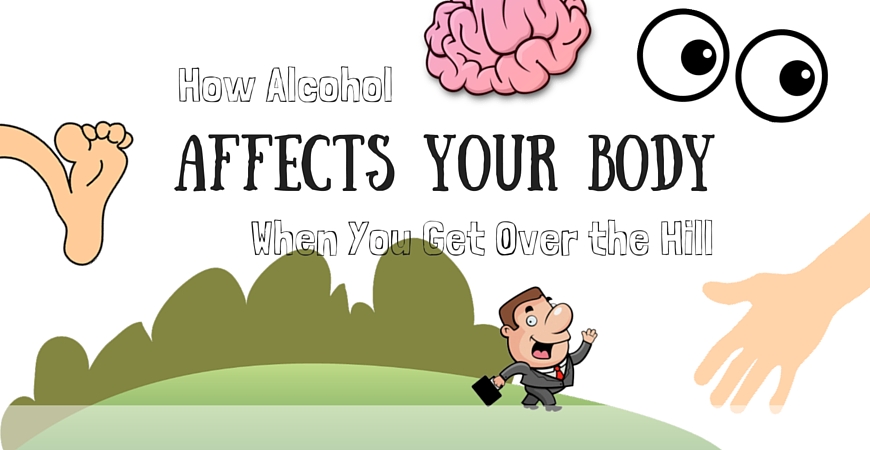Life & Style recently published an article about “What Alcohol Does to Your Body After 40.” They cited studies that found alcohol can give people acne, increase the chance of cancer and liver disease, reduce fertility and gain weight. But it’s not just about the alcohol, it’s about it works in your aging body as well. Here’s what they had to say.
The article quotes Paul Wallace who said, “Alcohol affects just about every system because it’s a small molecule that goes everywhere in the body. From the gut to the heart, the blood vessels to the skin, its effects are all-pervasive.”
Its affects are much worse after 40 though. “The organs that metabolise alcohol, such as the liver and stomach, shrink as you get older, so alcohol stays in your system longer,”explained Dr. Tony Tao. “Plus, the total fluid in the body is a lot less – we get more dehydrated as we get older – so because alcohol is distributed in blood which will be more concentrated, it won’t be broken down as quickly as it would in the bloodstream of a 20-year-old.”
The Life & Style article provided a great list of ways alcohol affects different parts of your body as you get older:
Your Brain
“Alcohol gets through the blood-brain barrier where it works as a depressant,” says Prof Wallace.
“We feel quite excited and stimulated when we drink because it’s having a depressing effect on controlling behaviors such as judgment, self-monitoring, planning and reasoning.
“Over time this gives you a higher propensity to mood problems such as anxiety and depression.”
Your Weight
Alcohol contains seven calories per gram, nearly as much as fat (nine calories), and the body recognises its by-products as toxins and breaks these down ahead of the nutrients in food, says nutritionist Robert Hobson, co-author of The Detox Kitchen Bible.
“When the body gets around to metabolising the food, it may no longer require the calories, so they get stored as fat.”
Drinking can suppress the hormone leptin, which controls appetite, which is why people can overeat when drinking. As a sugar source, alcohol raises insulin and turns on fat storage by increasing fatty deposits in the liver and, in middle age, excess can lead to fat storage around the stomach – “beer belly”.
Your Skin
Alcohol causes flushing, says Prof Nick Lowe, consultant dermatologist and spokesman for the British Skin Foundation. “This can trigger rosacea, a chronic redness in the skin, because the blood vessels enlarge and produce more blood flow,” he says.
And those spots after a night out? “Alcohol can make people stressed and anxious, and this produces the androgen hormones that stimulate acne,” says Prof Lowe.
As for the reason heavy drinkers look a little worse for wear: “The skin becomes dehydrated, and the fluid lost can lead to flakiness and puffiness around the eyes. Plus, the excess sugars you’re consuming, especially with beer and wine, damage the DNA and collagen in the skin, which can lead to more rapid ageing.”
Your Heart
People who regularly binge drink – consuming double the daily limit of three to four units for a man and two to three units for a woman or more in one session – dramatically increase their risk of stroke, says Prof Wallace.
Drinking raises blood pressure, which increases heart attack and stroke risk. Excessive alcohol also damages the heart’s ability to pump, cardiomyopathy, which increases risk of heart failure, says Dr Mike Knapton, associate medical director of the British Heart Foundation.
But surely a glass of red wine is good for the heart?
Knapton agrees research does confirm this, “but the benefits come from less than one glass of red wine a day, so the first glass might do you good, but more won’t”.
Your Liver
Liver disease has risen by a staggering 400 per cent since the Seventies. “Those at risk are not just chronic alcohol abusers, but also middle-aged professionals who drink a little too much most nights,” says Dr Debbie Shawcross, consultant hepatologist at King’s College Hospital liver unit.
“The liver may start out a little fatty and then if you continue heavily drinking between, say, 40 and 55, the fat and inflammation creates scar tissue and the liver shrinks and – for about one in six people – can lead to cirrhosis or liver disease.”
The liver has the ability to heal itself and the British Liver Trust suggests three consecutive non-drinking days a week to allow it to regenerate – it also has an iPhone app, called Spruce, to help work alcohol-free days into your week.
Cancer Risk
Each year about 13,000 cases of cancer in the UK are attributed to alcohol consumption. “In terms of cancer risk, there is no safe level of drinking,” says Nicola Smith, health information officer for Cancer Research UK.
“The cancers most closely linked to alcohol consumption are those of the mouth, oesophagus, bowel, breast and throat,” she says. “The more you drink, the higher your risk because ethanol in alcohol is broken down into acetaldehyde, which damages DNA.
Plus, if you’re smoking and drinking, you’re increasing your risk of mouth and throat cancer because alcohol makes cells more responsive to the toxins in tobacco smoke.”
Your Fertility
A Danish study of thousands of couples who had stopped contraception in order to conceive found that teetotal (sober) women fell pregnant much sooner than even “social” drinkers and also had a lower miscarriage rate.
Even where couples resort to IVF, a US study found that moderate drinking (half a bottle of wine a week) was associated with an 18 per cent reduction in success rates for women.
“For men, excessive alcohol consumption lowers testosterone levels and reduces sperm quality and quantity,” says Dr Gillian Lockwood, medical director of Midland Fertility.
The “sperm cycle” is 70 days, so the damaging effects of a serious binge may last a couple of months.
If you’re more of a visual person, check out this video on how alcohol affects your brain and body!

